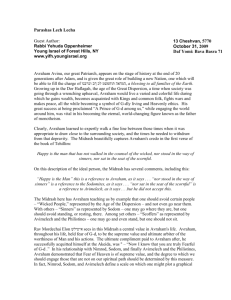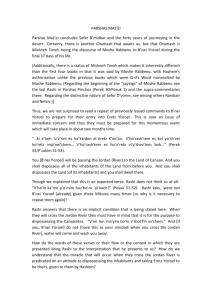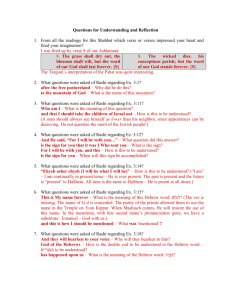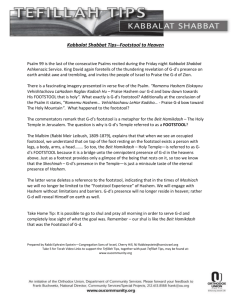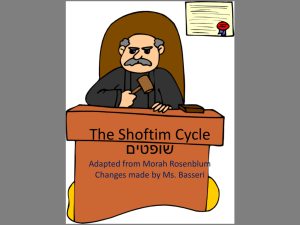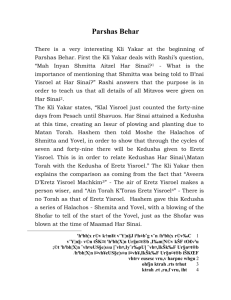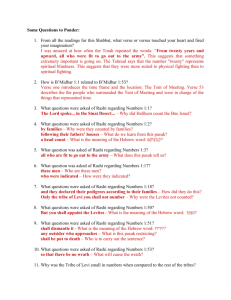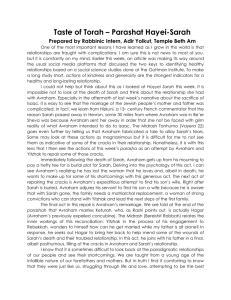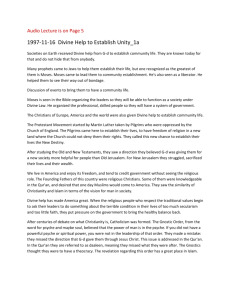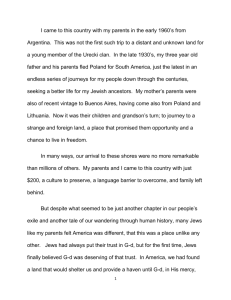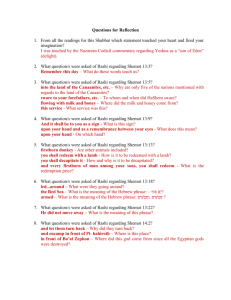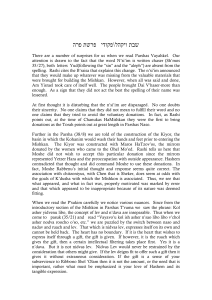Vayeshev 5768
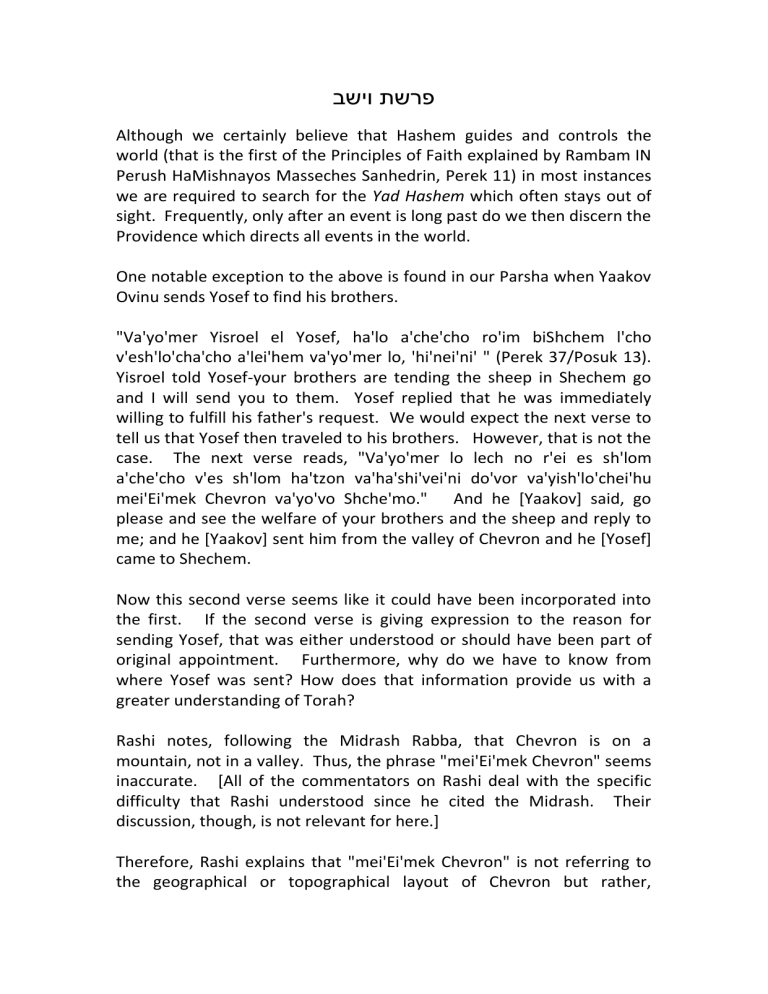
בשיו תשרפ
Although we certainly believe that Hashem guides and controls the world (that is the first of the Principles of Faith explained by Rambam IN
Perush HaMishnayos Masseches Sanhedrin, Perek 11) in most instances we are required to search for the Yad Hashem which often stays out of sight. Frequently, only after an event is long past do we then discern the
Providence which directs all events in the world.
One notable exception to the above is found in our Parsha when Yaakov
Ovinu sends Yosef to find his brothers.
"Va'yo'mer Yisroel el Yosef, ha'lo a'che'cho ro'im biShchem l'cho v'esh'lo'cha'cho a'lei'hem va'yo'mer lo, 'hi'nei'ni' " (Perek 37/Posuk 13).
Yisroel told Yosef-your brothers are tending the sheep in Shechem go and I will send you to them. Yosef replied that he was immediately willing to fulfill his father's request. We would expect the next verse to tell us that Yosef then traveled to his brothers. However, that is not the case. The next verse reads, "Va'yo'mer lo lech no r'ei es sh'lom a'che'cho v'es sh'lom ha'tzon va'ha'shi'vei'ni do'vor va'yish'lo'chei'hu mei'Ei'mek Chevron va'yo'vo Shche'mo." And he [Yaakov] said, go please and see the welfare of your brothers and the sheep and reply to me; and he [Yaakov] sent him from the valley of Chevron and he [Yosef] came to Shechem.
Now this second verse seems like it could have been incorporated into the first. If the second verse is giving expression to the reason for sending Yosef, that was either understood or should have been part of original appointment. Furthermore, why do we have to know from where Yosef was sent? How does that information provide us with a greater understanding of Torah?
Rashi notes, following the Midrash Rabba, that Chevron is on a mountain, not in a valley. Thus, the phrase "mei'Ei'mek Chevron" seems inaccurate. [All of the commentators on Rashi deal with the specific difficulty that Rashi understood since he cited the Midrash. Their discussion, though, is not relevant for here.]
Therefore, Rashi explains that "mei'Ei'mek Chevron" is not referring to the geographical or topographical layout of Chevron but rather,
"mei'ei'tza 'a'mu'ko shel o'so Tzaddik ha'ko'vur b'Chevron l'ka'yeim ma she'ne'emar l'Avrohom bein ha'b'so'rim 'ki ger yi'h'yeh za'r'a'cho' "
(Perek 15/Posuk 13).
The sending of Yosef derived from the profound counsel of that Tzaddik who is buried in Chevron in order to fulfill what [Hashem] said to
Avrohom-your children will be strangers [in a land which is not theirs].
This Rashi is based on Masseches Sota (11 a) from which Rashi quotes almost verbatim.
There is another version in Midrash B'reishis Rabba (Perek 84/Parshata
13) writes in the name of Rav Acha, "…ho'lach l'hash'lim o'soh ho'ei'tzoh ho'a'mu'koh she'no'san HaKodosh Boruch Hu bei'no u'vein cho'ver no'eh she'ho'yoh ko'vur b'Chevron, 'va'a'vo'dum v'i'nu o'som…' ". Yosef went to complete the profound counsel that Hashem gave that lovely colleague who was buried in Chevron as it says they [B'nei Yisroel] will serve them [their foreign masters] and they [those foreign masters] will afflict them. [Some of the commentators say that Avram is called here
"cho'ver no'eh" because that is an expansion of the word "chevro n".]
This has a major difference from the version in Masseches Sotah. This
Midrash says that the counsel was from HaKodosh Boruch Hu and not from Avram!
Whatever the case, we are told here from the very outset that the events that are being set into motion at this point will have far reaching effects. We do not have to wait until the end to look back and then try to make sense of all that occurred. The rationale is given to us from the beginning and we are able to use it as our guide as we follow the events as they unravel. [Since we have seen two versions of the source of that counsel, that subject still needs evaluation.]
In fact, in hindsight after learning the Rashi we can then answer the question that should have been asked from the beginning. Why does the Torah tell us that Yisroel told Yosef? Why not use the more common name of Yaakov?
The answer is now evident. That name Yisroel, which implies the
Guiding Hand of Hashem, is used because that Guiding Hand is revealed to us before anything whatsoever happens.
Now the fact that there is much more here than meets the eye regarding the mission to which Yosef was entrusted also becomes clearer as the history is revealed to us.
After the sale of Yosef, we read, "Va'yo'shov R'u'vein el ha'bor v'hi'nei ein Yosef ba'bor…" (Posuk 29). Reuven, who prevented the murder of
Yosef, was not around during the next hours when Yehuda suggested the sale of their brother. Where was he? According to the first explanation that Rashi gives us, "she'hi'gi'a yo'mo liei'lech u'l'sha'mesh es o'viv." That particular day happened to be the one in which it was
Reuven's task to be of assistance to his father, taking care of his needs.
This is an astounding piece of information. If the brothers took turns of regularly going to visit their father, that it should be presumed that he was brought up to date regularly on the welfare of the brothers and the state of the sheep which they were tending. Therefore, it was not necessary at all to send Yosef-except that the mission was guided with an eternal purpose in mind, not the immediate one as it appeared on the surface.
[This explanation sheds light on the following section of our Parsha dealing with Yehuda and Tamar. There, too, the events are exceptional from the death of the sons of Yehuda, to the mistaken identity of Tamar, to the symbolism of the payment guarantees that were given, concluding with the unusual birth of their twins which followed the historic admission of Yehuda.
These events cannot be seen as everyday occurrences with Hashem in the background. Here too, Hashem is the apparent and revealed guide.
It is improbable to assume otherwise.]
Now certainly we are able to accept that G-d can bring about events He wishes them and how He wishes them, when and where.
What is puzzling though is that there is an implication that the mission of
Yosef that is to lead to the first exile-of Egypt was to fulfill the word of
Avraham Ovinu. Why would Avraham Ovinu want that?
Secondly, how are we to understand the phrase "eitza amuka"? What made this counsel deeper or more profound than any other?
[Regarding "eitza amuka" both Shem Mishmuel (5673, d.h. va'y'shal'chei'hu) and Michtav MeiEliyahu (Book 2/Page 174) say that the punishment of exile was a result of the impropriety of the question that Avram posed to Hashem: "Ba'moh 'ei'da' ki o'ri'she'no" (Perek
15/Posuk 8). How will I [Avraham] know that I will inherit it [Eretz
Yisroel?]
The first point we must examine is who exactly gave that piece of advice that was behind sending Yosef to his brothers. In another Midrash there are two versions of a dialogue that took place between Hashem and Avraham Ovinu at Bris Bein HaB'sorim (Perek 15/Posuk 13). There
Hashem says to Avram, "…yo'do'a tei'da' ki ger yi'h'yeh zar'a'cho b'e'retz lo lo'hem va'a'vo'dum v'i'nu o'som ar'ba' mei'os sho'noh…" You should definitely know that our offspring will be exiles in a land that is not theirs and they will serve them [the foreign country] for a period of four hundred years.
As noted before, there are two versions as to the source of the eitza that led to the sending of Yosef to his brothers: Hashem and Avraham. This is a source that includes both of those versions.
Midrash Rabbah (Perek 44/Parshata 21) explains that Hashem told
Avrom that if his descendants will either fulfill the Torah and honor the
Beis HaMikdosh or they will have Gehinom or Golus. Of course we know that exile rather than Gehinom-and perishing-was chosen. That is said in the verse cited above, “ki ger yi’h’yeh zar’a’cho…”
One explanation in that Midrash is that Avraham chose exile. That explanation is then in consonance with the Gemara in Masseches Sotah and the explanation that Rashi chose to give in Chumash.
The other explanation is that Avram originally chose Gehinom and
Hashem chose differently and imposed His Will on Avram and changed the choice to Golus.
According to the first version, therefore, the exile that fulfilled
"va'a'vo'dum v'i'nu o'som" was based on the decision that Avraham made. According to the second version, that exile was based on G-d's decision.
Now we must ask why Rashi prefers the version that makes the exile a product of Avraham rather than a product of Hashem, in addition to understanding the particularly profundity that the sources themselves, as well as Rashi, note.
Eitz Yosef on Midrash Rabba says that the depth is simply a reflection of the fact that it was Hashem's decree. Therefore by definition it was deep.
This answer is problematic. Midrashim and other sources are replete with statements that definitely reflect the Will of G-d. In general we do not refer to such decrees as deep. It is simply understood that they are so since they come from HaKodosh Boruch Hu. Since our source is the exception, we still find ourselves lacking in understanding. Why is this particular instance called "amuka", deep?
In Pirkei D'Rabi Eliezer (Perek 20) we find an interesting discussion in the name of Odom HoRishon. Odom Horishon knew that he was going to die. He cited the verse, "Ki yo'da'ti mo'ves t'shi'vei'ni u'veis mo'ed l'chol choi" (Iyov Perek 30/Posuk 23). I know that death will return me [to the ground] and that [the ground] will be a house of destiny for all life.
Odom thus prepared for himself a burial plot. However, he greatly considered what that plot should be like since he was concerned that he would be turned into an object of idolatry. Odom said that if the luchos-
Ten Commandments which were only written by the "finger" of Hashem will perform miracles, my body which has been created by Hashem's
"two hands" will certainly be viewed as having transcendent powers and will turn into an item of worship.
He thus searched for an appropriate plot that would allow him to be buried deeply in the ground, so that he would not be able to be discovered and changed into an entity of idolatry.
This Midrash provides us with a fascinating piece of information if we consider its implications. Why was it important to Avraham Ovinu to purchase Machpela? Why did Avraham Ovinu go to the great trouble and expense to buy this particular piece of real estate? Why was it important for Avraham to be buried in the same plot as were Odom and
Chava?
By enabling the Ovos and I'mohos to be buried in Machpela, Avraham
Ovinu was pledging the opposition of B'nei Yisroel to idolatry. That opposition to idolatry was a statement confirming the dedication of our forefathers to serve Hashem. They had no interest in selfaggrandizement. They had no interest in their making the history books and being chosen as some type of divinity. They existed to serve G-d. A starting point for that service was the rejection of idolatry.
Odom Horishon was the first to make such a statement. He was witness to the steady drop in belief in G-d in the earlier generations. He saw what happened in the generation of his grandson, Enosh. "U'l'Shes gam hu yu'lad ben va'yik'ro es sh'mo Enosh oz hu'chal li'kro b'shem Hashem"
(B'reishis Perek 4/Posuk 26). And to Shes there was born a son whom he called Enosh; then there was a profanation in calling [human=enosh] names in the name of G-d.
As Rashi explains, "L'shon chu'lin likro es sh'mos ho'o'dom v'es sh'mos ho'a'tzo'vim biShmo shel HaKodosh Boruch Hula'a'so'son e'li'lim v'lik'ro'son e'lo'hus." "Hu'chal" in our verse means "profanation" as they began naming their children and their personal gods with Divine names, misleading the public into idolatry.
Odom's fear of becoming an idol is quite real and he wishes to take practical steps to eliminate that which will take place after his death and for over which he has no control. He thus finds a grave that one can be buried in, very deeply, far removed from anyone who may wish to deify him.
We can now have a greater insight into the motivation of Avraham
Ovinu to acquire M'eoras HaMachpela for him and the other Ovos.
Avraham Ovinu wanted all of the Ovos to continue the example begun by Odom HoRishon. It is true that Odom HoRishon initiated this idea.
But when he introduced this idea, Odom HoRishon limited it to himself alone. We are not told that he sought a similarly appropriate burial place for others. Odom HoRishon did not understand or did not seem it necessary to make such an enactment for future generations. He introduced a one-time enactment. Perhaps it was due to the fact that only he, seemingly, was created directly by Hashem.
Avrohom Ovinu understood the need differently. It was not sufficient to make a onetime enactment. The enactment had to be permanent.
Even in their death, the Ovos had to pledge their total dedication to G-d and one way to do it was to join in their burial in a site that proclaimed the Oneness of G-d and how that even the greatest of people remains only a creation of Hashem. It is true that subsequent people will not reflect the sanctity of G-d by the way their bodies were made. However, they will reflect the sanctity of G-d, nevertheless, by the way they function in the world, by the richness of their neshama which they will preserve in the pure and pristine state in which they received it.
Odom HoRishon found a burial cave dug deeply into the ground.
Avrohom Ovinu made that burial cave an "eitza amuka". He transformed an idea into a mission. He transformed an important thought into a tradition. Thus, though Machpela was founded by Odom
HoRishon it received eternal meaning only through the decision of
Avraham Ovinu.
[This can explain the interpretation that Chazal (Masseches Sotah 10 b) gave to another verse in our Parsha. When Tamar stationed herself so that she would be visible to Yehuda, the Posuk writes, "…va'tei'shev b'pe'sach 'ei'na'yim a'sher 'al derech Timnoso…" (Perek 38/Posuk 14).
She waited there at Pesach Einayim. Certainly, Pesach Einayim could be a certain location on the road to Timna. Rashi though cites the Chazal that says she waited, "B'fis'cho shel Avraham Ovinu she'kol 'ei'nayim m'tza'pos lir'o'so." Tamar was at the opening of [the grave of] Avraham
Ovinu (i.e. Machpela) that all eyes are [there focused] to see him.
What is the meaning that all eyes are focused towards M'oras
HaMachpela to see Avraham Ovinu? It could very well be that this means that Avraham Ovinu set the tone and the pattern of our lives in his death as well as in his life. Thus we are able to receive substantive spiritual sustenance even from his burial place.
By standing at that place, Tamar betrothed her future to the principles upon which Avraham Ovinu founded what was to be 'Am Yisroel. By standing by Machpela, Tamar said for all generations that she saw in it the means of insuring the continuity of 'Am Yisroel. And, of course, that occurred when she gave birth to Peretz (Posuk 29) who was the ancestor
(Rus Perek 4/P'sukim 18-22) of Dovid Melech Yisroel Chai V'Kayom.]
Now that we understand that the "eitza amuka" was due to Avraham
Ovinu, we must understand the connection between Machpela and the impending Golus.
Apparently Rashi understood that the concept of eitza amuka was truer if it came directly from Avraham Ovinu, not imposed by G-d, but from the insight and understanding of Avraham himself.
What was that first Golus? What occurred there?
Hashem chose the Golus to be the locus of the creation of the Jewish
People. Hashem chose the Golus to be the proper environment for the giving of Torah.
Evidently the formation of 'Am Yisroel had to take place in the hostile environment of Egypt, Mitzrayim, literally "the straits". Mitzrayim imposed a pressure upon our ancestors to conform to their norms, to their culture, to their way of life. It was precisely in that environment that our ancestors had to reject Avoda Zara and pledge their allegiance to G-d. To affirm their allegiance to G-d in the absence of any outward pressure against belief in G-d would be incomplete. The affirmation of our belief in G-d goes hand in hand with the m'sirus nefesh that is an obligation that is part and parcel of the prohibition of idolatry in which we must love Hashem even "b'chol naf'sh'cho" (D'vorim Perek 6/Posuk
5). Loving G-d with all of your soul means "a'filu hu no'tel naf'sh'cho"
(Masseches B'rochos 54 a), even if G-d needs to take your life in your fulfillment of this Mitzvah to love Him Yisborach. Mitzrayim enabled
such a commitment to be meaningful and true and not just some wishful thinking disconnected from the reality in which our ancestors found themselves.
Thus that tradition begun by Avraham Ovinu, from the depths of
Machpela, that the dedication to belief in G-d must continue in death just as it was vital in life, was required to be the next step for our People when it came to inculcating that basic value in 'Am Yisroel for all generations. The affirmation must be meaningful when there is a choice and the choice had to be made to affirm complete and extreme loyalty to G-d and His reign. Egypt provide the framework for that choice and thus Golus was a necessary part of our destiny.
This is the message of the mission of Yosef which was to lead us into
Golus. The Golus was to provide us with the proper environment to know what we mean when we say we believe in G-d and we reject anything less than a complete and perfect belief in G-d.
The history of 'Am Yisroel was designed by HaKodosh Boruch and directed by Him Yisborach. From our Parsha we learn that Hashem allowed us to be His partners, his "chover no'eh" in founding the Jewish
People and furthering its history. When do we have the right to be His partners? When are we invited to take part in the founding and the continuation of our People? When are we allowed to take responsibility for our own Destiny? The answer is found in the Eitza Amuka that stemmed from Chevron and Machpela.
We often look at Parshas Vayeshev with a great deal of sadness. The sale of Yosef and the events that transpired from it are very regrettable.
However, since it is Yad Hashem that directs history, we are not allowed to look at those events as being regrettable in the view of destiny. In the view of destiny, our Parsha became the foundation for Sefer Sh'mos,
Sefer Geulah.
We live in difficult times. I do not know if our times are more difficult than other times, but they are difficult nonetheless. From our Parsha we learn that if we seek the eitza amuka from Chevron we can pray that from these difficult times the Geula will take place once again as it did in the beginning of our People.
Shabbat Shalom
Rabbi Pollock
